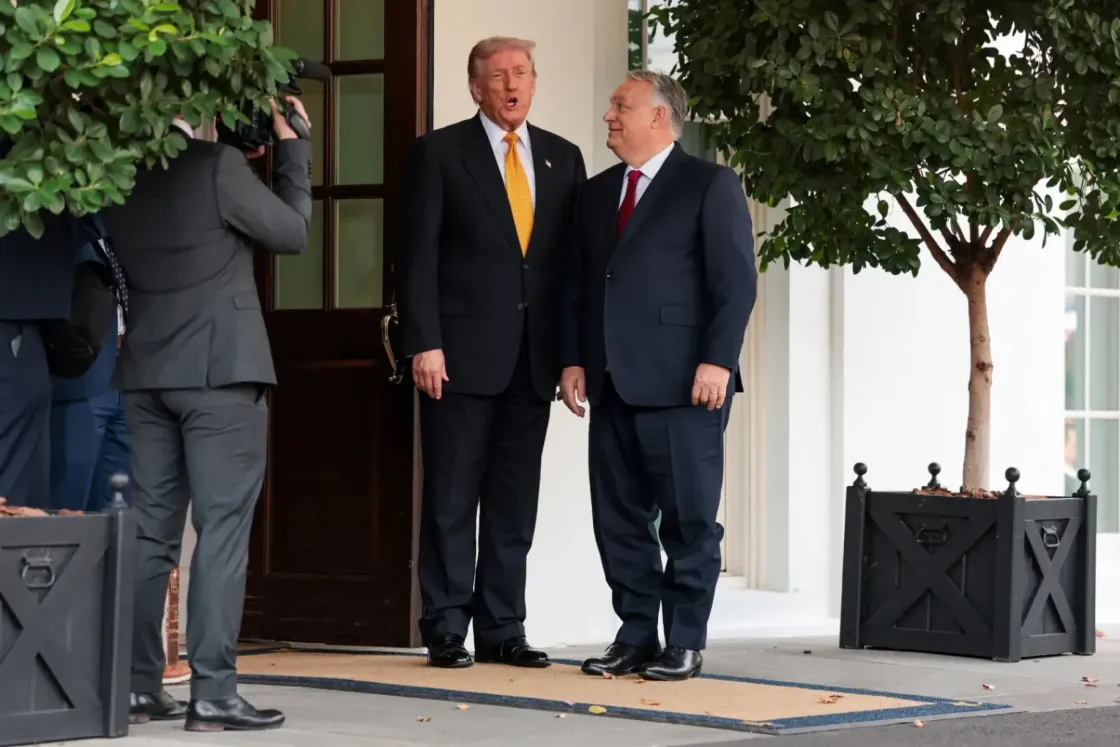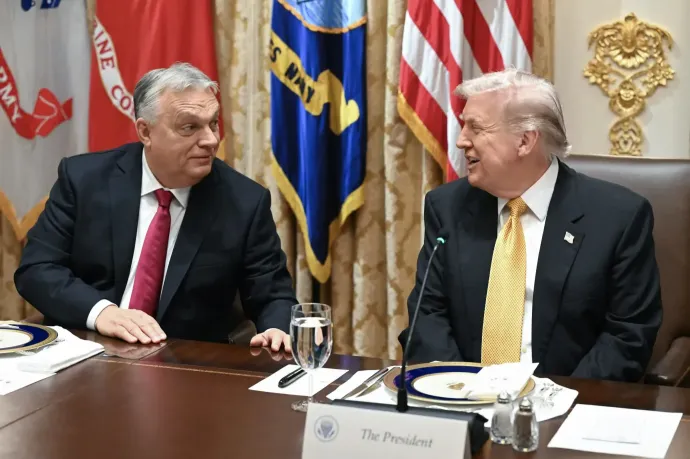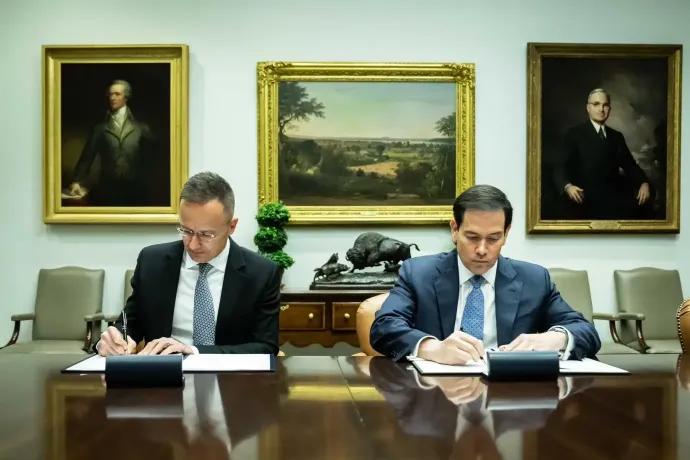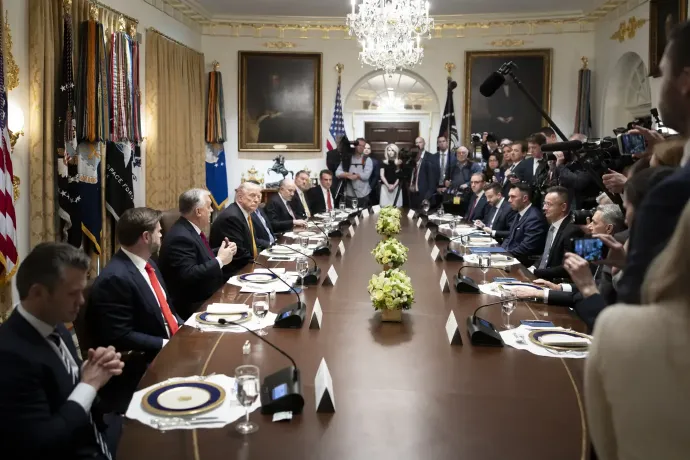
Viktor Orbán has achieved what he set out to do when he traveled to Washington: in the two leaders' first bilateral meeting since Donald Trump's inauguration, the prime minister managed to secure what he had hoped for in both political and economic terms – and with regard to certain gestures, perhaps even more.
Of course, a meeting with the US president at the White House is always of particular importance for the Hungarian head of government – and there have not been that many in Hungary's history – only eight – including Károly Grósz's visit before the change of regime. Of these, four are linked to Orbán, but this was the first time that there were specific economic agreements on the table, and it was in the shadow of Russia's war against Ukraine, that the Prime Minister had to negotiate about Hungary continuing to import Russian energy sources.
This was probably the most sensitive part of the negotiations, although it had certainly already been decided in earlier talks that there could be common ground with Washington on this issue. Which is probably why Orbán took the risk of taking a very large delegation with him – unlike in the case of the several meetings the two had in between Trump's two presidential terms, when they met at Trump's Florida residence.
Trump on Orbán: A great leader
The first important gesture Orbán received on Friday was at the entrance to the White House when, in response to a journalist's question shouted from a distance about whether Hungary could continue importing Russian energy sources, Trump simply pointed to the head of the Hungarian government and said, “ a great leader.”
The second telling gesture was the seating arrangement for the luncheon, where Orbán was seated between Trump and Vice President J. D. Vance, opposite the other members of the Hungarian delegation. This meant that they all sat on one side, so they could answer questions from journalists on the other side of the wide table from the same position – as opposed to what happened in the same room in October with the Ukrainian president. Volodymyr Zelensky was seated opposite Trump, so journalists asked their questions from behind him, and he could only have eye contact with them by turning around, while Trump was able to answer questions comfortably.
During this part of the luncheon, Trump was full of praise for Orbán. He referred to him as Hungary's "beloved leader" who is doing a great job running the country and could serve as an example to European politicians who, according to the US president, have made mistake after mistake in their migration policy. Europe has been "flooded with people from all over the world," Trump said. "I told European leaders that they had better stop this, because otherwise there will be no more Europe. They have done something very dangerous”, he said.
In his view, Orbán has not made any mistakes, which is why "many people all over Europe respect him. Not necessarily everyone, but they have been proven wrong," Trump said. This alone was a diplomatic success for Orbán, but it could have easily been overshadowed if no practical agreement had been reached. This could have been the case if they had not found common ground on Russia's war against Ukraine.
Trump's relationship with Ukraine has gone through several twists and turns. At the moment, he is on more cordial terms with Ukrainian President Volodymyr Zelensky and more distrustful of Vladimir Putin, at least when it comes to ending the war. Despite this, Orbán was able to – without Trump's objection – echo the Kremlin's narrative that European governments are warmongers because they mistakenly believe that Ukraine can win the war on the front lines.
"Are you saying that Ukraine cannot win this war?," Trump turned to Orbán at one point, who, after a brief pause, threw his hands in the air and said with some sarcasm: "Miracles can happen."
CNN summed the scene up by saying that Orbán had reiterated the arguments put forward by the Russians. At the same time, Orbán made sure to praise Trump's valuable peace efforts, even though the United States is supplying weapons to Ukraine, albeit not as aid but on a commercial basis, with European financing. Orbán did so, even though he consistently refers to strengthening Ukraine's defense capabilities with arms shipments as a pro-war stance. He concluded his train of thought by saying that Hungary is ready to contribute to Trump's peace efforts to the extent of its capabilities, after which the US president confirmed that if he ever has another meeting with Putin, he would like it to happen in Budapest.
Exemption from sanctions was Orbán's main goal
Even before the luncheon, Trump had been quite permissive in his statements about Hungarian imports of Russian energy sources, adopting Orbán's position that Hungary cannot give up Russian oil and natural gas.
This was achieved despite Trump currently being less trusting of Russian President Vladimir Putin than when he took office, clearly seeing him as an obstacle to peace or at least a ceasefire between Ukraine and Russia, and therefore considering sanctions against the aggressor to be important. This is what led to secondary tariffs being imposed on countries importing Russian energy sources, which caused India to reduce its purchases of Russian crude oil. After pulling out of the Budapest summit indefinitely, Trump also imposed new sanctions on Russia's biggest oil companies, arguing that Russia was not doing enough for peace.

After the closed door negotiations, speaking to Hungarian pro-government outlets at a press conference, Orbán announced that Hungary had received an exemption from the Americans, meaning that it would not face sanctions if it continued to import Russian oil in the future.
Incidentally, the EU had also granted this exemption to the Czech Republic, Slovakia, and Hungary for crude oil purchased via pipeline until 2027, but this alone would not have protected Hungary from the US sanctions that Orbán has now secured an exemption from.
"We have been granted complete exemption from sanctions in the case of imports coming through the Turkish Stream and Friendship pipelines.
There are no sanctions that would restrict or make supplying Hungary this way more expensive. This is a general exemption with no time limit," Orbán announced.
A White House source later told Reuters that the United States had granted the exemption for one year. We have therefore sent a question about the time frame to the Hungarian Government's Information Center, and we will report back as soon as we receive a response.
Although we did not receive an answer, Foreign Minister Szijjártó stated in a video posted on Facebook on Saturday afternoon: “The Prime Minister spoke clearly. He agreed with the US President that we would receive exemption from the sanctions for an unlimited period of time.”
Thus, Orbán did not have to choose between maintaining good relations with Russia and Trump's friendship – although it is a different matter that he is essentially the only one in the EU with this approach, about which Orbán, as the leader of a government he described as having a modern Christian orientation, said: “Hungary is a special island in a liberal ocean.”
American LNG and nuclear fuel
Orbán did, however, take one cautious step toward reducing the 90 percent share of Russian natural gas Hungary is currently importing: he agreed to purchase $600 million (approximately 200 billion forints) worth of American liquefied natural gas. The announcement of the US State Department did not specify how long the Hungarian side would take to fulfill this agreement. According to the sources of Bloomberg, this could mean two billion cubic meters of natural gas over five years, or 0.4 billion per year, which is not a very significant amount given the 8-9 billion cubic meters the country needs annually, which is mostly supplied from Russian sources.
However, the government has also already signed agreements with the British company Shell and the French company ENGIE to purchase 0.4 billion cubic meters of natural gas per year from both. So, albeit cautiously, but the proportion of purchases outside Russia is growing, which, combined with the agreement on the purchase of American natural gas, may have contributed to Trump not imposing sanctions on Hungary for its Russian imports.
However, another agreement announced on Friday, namely one concerning nuclear cooperation, an area in which Russia has had an exclusive role in Hungary so far, may have carried even greater weight. The visit resulted in a specific agreement and a declaration of intent with long-term prospects in the field of nuclear energy:
- The agreement stipulates that the American company Westinghouse will enter Hungary's nuclear industry and supply fuel worth USD 114 million (approximately HUF 38 billion) – the question, however, is when, given that the nuclear power plant currently has enough enriched uranium to last up to two years. Orbán was keen to emphasize that this is diversification, not replacement, meaning that we will soon be purchasing Russian, American, and French fuel as well.
The letter of intent states that
- the US may build ten small modular reactors (SMRs) in Hungary – although Szijjártó indicated that this number may be lower – with a total value of USD 20 billion. According to Orbán, the parliament will amend the pertaining law next week to this end.
- and Hungary would import American waste storage technology which is better than what it has at present. Foreign Minister Péter Szijjártó said that this would allow the spent fuel, which is still dangerous due to its radioactivity, to be stored safely in the long term without having to be taken out of the territory of the power plant. If implemented, this agreement could be worth between $100-200 million, according to sources.
The announcement by the US State Department also noted that, following the declaration of intent, there is a possibility that “Budapest could become the center of an emerging Central European SMR market, launching a new transatlantic industry using market-leading American nuclear innovation"
In addition, Orbán announced it as a fait accompli that Paks II, which is being constructed under Rosatom's leadership—and which has essentially been at a standstill for several years—will be exempt from all US sanctions, which will be completely lifted following the temporary suspension in June. It is unlikely that Rosatom will build the two new Paks units on its own, if only because a German-French company have already been integrated into the project.
New actors may join the Russians
Nuclear cooperation between Hungary and the United States is definitely justified, and in fact, such a move has been long overdue, according to independent experts in the industry. Attila Aszódi, a university professor and nuclear expert, for example, specifically expected this to be a key topic in Washington, so a day before the summit, he summarized some of the potential directions for cooperation in a very thorough article on Portfolió.
State actors are always a little more cautious, they always send a "reassuring" message to Russia as well, he said, also pointing out that the new American relationship is very useful, and it will be an additional element in the project, which does not mean that existing contracts are not important. The same caution with regard to Russia has also characterized Hungary's purchases of natural gas from the West, but in both cases, the important thing is that there are new actors entering the Hungarian import market, and the proportions can more easily change later on.

Going through the items one by one, Aszódi also argues that Paks I could purchase American fuel immediately. Several countries which operate VVER-440 nuclear power plants similar to the one in Paks have already signed contracts with the major American player, Westinghouse. The Slovaks, the Czechs, and the Finns will also be purchasing fuel from them.
As for spent fuel, the government is currently preparing to significantly extend the operational life of Paks I. The National Radioactive Waste Repository (NRHT) was established for the final disposal of low- and medium-level radioactive waste from nuclear power plants. Some additional operating time may still be covered by the current storage capacity, but for the additional years, either the existing infrastructure will have to be expanded or another solution will have to be found. The letter of intent paves the way for this, as the Americans have storage technologies for spent fuel assemblies. This container technology has been proven successful in the United States, and starting the licensing process will be possible, but it takes quite a long time. Once that's done, however, even the production could be brought to Hungary.
Minister of Energy Csaba Lantos has often suggested that the US could build SMRs, or small modular reactors, in Hungary, but it should be noted that this technology is still more of a promise than a reality. There are many technologies running in parallel. According to Aszódi, a prototype of the BWRX-300 boiling water reactor developed by GE Hitachi Vernova is currently being built at the Darlington nuclear power plant in Canada. The first unit of the planned four-unit facility is under construction, with the Poles also planning to build such reactors. As part of this freshly announced US-Hungarian Memorandum of Understanding, the construction of up to 10 GE Vernova Hitachi reactors may be a realistic goal.
Some things did not work out, such as Nu Scale, which seemed very promising and even had a pilot plant built in Idaho, but the project was canceled a year ago. Hungary will probably opt for a tried and tested model, as building the first of anything always involves a high risk.
Paks is also watching
The most relevant leaders in terms of the operating units in Paks, as well as those under-construction were also part of the Hungarian delegation that travelled to the the United States. According to the official Hungarian position, the American container storage technology is of high-quality, but the Hungarian side still maintains that Paks II will be Russian. No one wants to talk openly about the fact that this is not very realistic, because everyone is preparing for future legal proceedings, so officials prefer to say that American and Australian digitalization suppliers may also participate in the project.
Compared to hydrocarbons, the nuclear import market is different overall because purchases are needed less frequently (fuel does not come in the same way as oil or gas does through pipelines), and the Russians are primarily strong in certain processing and enrichment steps. But it is certain that replacing them may begin.

In terms of raw uranium, Russia is only the sixth largest producer in the world, with Kazakhstan, Canada, Namibia, Australia, and Uzbekistan being more prominent players. The stages of conversion, enrichment, and processing, i.e., the process of turning raw uranium into nuclear fuel, are more difficult to replace without the Russians.
Finally, even the transportation of nuclear materials is not a simple matter. The traditional route used to be by rail, with Russian fuel elements coming through Ukraine, but this is no longer an option. Hungary has a license for air transport, but a special permit needs to be obtained each time for the use of airspace.
What the business community had been waiting for did not happen
The Hungarian government also announced that it intends to purchase $700 million worth of defense equipment through foreign military sales, but there were some things that the two parties did not manage to agree on. One such issue was the reinstatement of the US-Hungarian double taxation avoidance agreement. In this case, it is not just a matter of some kind of theoretical agreement or lack thereof, but one that is causing enormous damage to the Hungarian economy.
On July 8, 2022, the United States notified Hungary that it would unilaterally terminate the double taxation avoidance agreement concluded between the two countries in 1979, effective January 1, 2024. The essence of this agreement was that if an individual or a company generates income (in this case, for example, a Hungarian in the United States or an American in Hungary), they only have to pay tax in one country, or at least no more than the tax rate of the country with the higher tax rate.
Without this, it is very difficult for Hungarian companies operating in the United States to collect their dividend income earned on American stocks. The other major problem is that this puts them at a huge disadvantage in the competition for foreign investment. The previous agreement was clearly more advantageous to Hungary than to the other party. After a while, Washington became dissatisfied with this and repeatedly indicated that there should be a renegotiation, but the Hungarian and American leaders were unable to find common ground.
The lack of an agreement has remained a major problem ever since, creating serious uncertainty among investors. It is a risk factor because taxes may or must be levied on income paid out of Hungary, which could jeopardize the return on investments, while the US is the third largest investor in Hungary after Germany and Austria. In the absence of an agreement, the allocation of shares in an American company or the additional administration of American citizens working in Hungary can be a deterrent, which is why the economic community was eagerly awaiting progress on this issue. However, this has not happened at this time.
For more quick, accurate and impartial news from and about Hungary, subscribe to the Telex English newsletter!